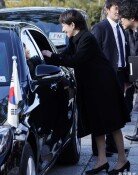[Editorial] Hope Work Project Corrupted
[Editorial] Hope Work Project Corrupted
Posted October. 20, 2009 09:16,
The Hope Work Project, the governments attempt to assist low-income households, is being exploited. The project is supposed to first select people from households earning less than 13.5 million won (11,500 U.S. dollars) per year. A sample survey by the Korea Labor Institute, however, found that 15.3 percent of applicants had assets exceeding 300 million won (255,600 dollars). The Dong-A Ilbo reported yesterday that even a middle-class housewife living in apartment worth 580 million won (490,000 dollars) in Seouls affluent Gangnam district got benefits.
The project provides jobs in the public sector and gives 830,000 won (707 dollars) in cash and coupons to households earning 100 to 120 percent of the minimum monthly income. Benefits are going to 250,000 households and the budget is 1.7 trillion won (1.4 billion dollars). Since provincial and municipal governments do not set the qualifications such as assets, the project has degenerated into pocket money for the middle class. Others have put their name on the projects list and received money without even working. The institute said lower income earners, whom the project is aimed at, accounted for only 18.5 percent of participants.
It is understandable that the government come up with assistance measures for the socially and economically marginalized. However good the cause might be, if officials or beneficiaries consider the budget easy money, they are instead stealing money supposed to go to those in need of real help. The public sector is different from households and businesses in that those who spend and those who pay are different entities, so the budget could slip away if not closely monitored.
The role of finance has increased and the administration has made welfare policies for low-income households in the wake of the economic crisis. Thus, financial support for students, small and mid-size companies, and small retailers and merchants has dramatically increased. If money is wrongly spent, however, those in real need such as the disabled, orphans and senior citizens who live alone will be adversely affected.
The soaring financial deficit will serve as an obstacle to the economy and a source of insecurity that will increase the burden of the next generation. It is worrisome that the deficit debt to be paid with taxpayers money is dramatically increasing every year and will reach 200 trillion won (170.4 billion dollars) next year. The government needs to review whether the budget is wasted in the course of stimulating the economy and implementing policies for low-income families.
Certain provincial and municipal governments are spending public funds without requiring strict standards in the run-up to the June local elections next year. Such spending should be strictly controlled for fair elections.





![[사설]참 구차한 김병기 전 원내대표](https://dimg.donga.com/c/138/175/90/1/wps/NEWS/IMAGE/2026/01/13/133151454.1.jpg)

